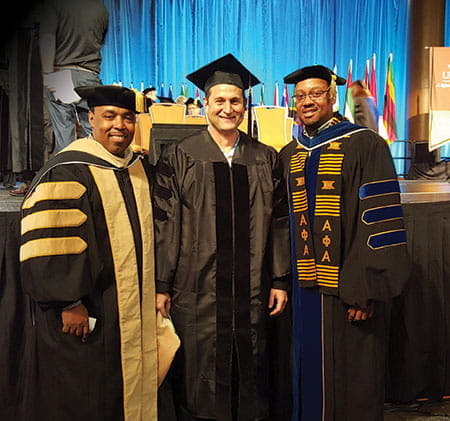
Dr. Sean Stanley ’11 felt anxious, yet excited as he drove to Orlando, Florida, for Walden’s Winter 2016 commencement ceremony. For him, the festivities began with a dinner to celebrate the graduation of Dr. Michael Donaldson ’15, Stanley’s mentee and close friend of nearly 3 years. But this was no ordinary dinner—it was actually the first time the men met face-to-face.
The following day—commencement day—Stanley proudly placed the doctoral hood on Donaldson. This act would represent the graduation of Stanley’s first student since becoming a faculty member in the Doctor of Business Administration (DBA) program—the same program he graduated from in 2011. What made this even more special was that Stanley was in the first graduating class of the DBA program. Stanley said he was intrigued by Walden’s commitment to social change, which led him to develop an ongoing activist relationship with his chair, Dr. Walter McCollum ’04.
“Dr. McCollum and I travel to Haiti together to do social work with children,” Stanley says. “He instilled in me the idea that my degree was not about me, but about bettering the lives of others.”
When Stanley became a contributing DBA faculty member in 2013, he aimed to pass on the same emphasis on enacting social change in his students. He first “met” Donaldson in the online classroom for his DBA 8100 course; the pair immediately bonded when Stanley reached out to Donaldson to reassure him of his decision to enter the program. “It put me at ease knowing I had a mentor who had been in my exact same position and understood what I was going through,” Donaldson says. “I was grateful that Dr. Stanley could guide me from a student perspective, not just as a faculty member.”
After Stanley became Donaldson’s doctoral study chair, their one-on-one interactions increased despite their distance; regular texts, emails, and weekly phone calls were the norm for the two men. Stanley soon developed a cohort of student mentees, and Donaldson emerged early on as the group’s leader—Stanley said Donaldson often vocalized ideas for the group to discuss before he did. “My trust in Michael began to grow as I realized he was serious about the program,” Stanley says. “Michael understood that it was a process that demanded that you accept critical reviews and not be bothered by it psychologically. This made our ability to work together as chair and student even more special. I was able to help him endure despite setbacks.”
Just because they are no longer required to communicate doesn’t mean their relationship has ended. On the contrary, they continue to keep in touch today: Donaldson is serving as a mentor for Stanley’s current students, and Stanley is providing recommendations to assist with Donaldson’s professional development.
“We have this idea that if we don’t see a person, we don’t know them,” Stanley says. “But the most important aspect of developing any relationship is communication. Walden provides an incredible venue for direct communication through teleconferences and residencies. Through our cohort conference calls, we got to learn more about each other each week. We became close like a family; it’s the greatest networking opportunity I have ever been part of.”
Dr. Sean Stanley, Dr. Michael Donaldson, and Dr. Walter McCollum



